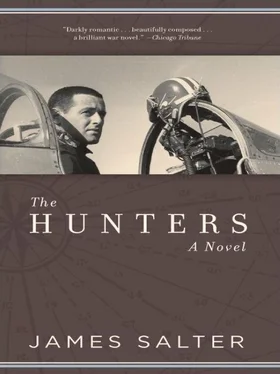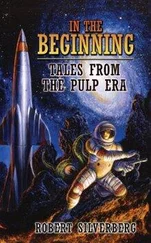“Sure. That’s fine with me. I don’t want your money.” He smiled. “I just need the practice.”
Pell dealt out the hands quickly.
It started out as a fairly close game. Cleve sat watching it for about three quarters of an hour, surprised at how well Daughters was doing, and hoping for him. Compared with Daughters’s gentle, almost resigned, attitude, though, everything about Pell’s game was polished and cool. He seemed at least moderately pleased with every card he drew, and he discarded with confidence. He gave the impression of indeed only practicing. Daughters was a good player, but Pell seemed to have the luck when it counted, and that made the difference. By the time Cleve went to bed, Pell was winning more than twenty dollars.
When the ships returned from a mission, everybody watched for them. Usually, they came lining back to the field in flights of four, flying tight show formation with the black smoke fading in parallel streams behind as they turned in toward the runway and landing pattern. They seemed to be most indestructible then. They were of frozen silver. Nothing could possibly dim that grace. No enemy could deny them. Departures were stirring; but every return, even the most uneventful, was somehow transcendent and a call to the heart to rise in joy. Out of the north they had come again, brief strokes of splendor.
If they carried their drop tanks back with them, nothing much had happened on the mission. That was the first sign. If they came back without tanks, and broken up into pairs and occasional singles instead of fours, there had been a fight. As they trailed down the final approach and landed, it was possible to look closely and see whether or not the gun ports were blackened and the ship had fired. If many noses were black, it had been a big fight. The news of what had occurred on a mission often came from the radio monitoring in combat operations long before the planes were nearing the field, but not many heard it there. Most found out by watching the ships return.
Cleve had flown twenty-four missions. Except for his fifth on Desmond’s wing, he had seen no real action. They were always far off, going away, if he saw them, or overhead no bigger than flies, or sometimes as big as wrens; but to get up to them was like trying to jump off the ground and catch a bird—the altitude disadvantage meant that much. For a while he simply called it luck, but after too long a time of that there was nothing to call it. And there seemed to be nothing that he could do, no way to change things. He felt himself caught in a trough of despair. Day after day, unreasonably, he was on those missions that encountered nothing.
The evenings came early to end the short afternoons. Standing on the hill of barracks in the cold, with the watery sun almost down, he saw them returning from the late mission. The chill of the earth came through his feet and then edged up to make even his ears ache. His eyes wept from the wind as he watched. They were coming back in pairs. None of them had tanks. There had been a fight. An intense sinking feeling came over him. There was only one flight of four in the whole group. It hurt him to watch, and it was too dark to see their noses, but he waited stolidly through it as ship after ship came in, whistling smoothly down to meet the ground. The worst part, he knew, was what lay ahead, the empty hours of melancholy that would not be filled until he flew again. It was like the start of a relentless headache with its unavoidable hours of pain.
The word came, as it always seemed to, from nowhere. Cleve heard it as he walked down toward the line. A truck drove by, and somebody called out. Colonel Imil had shot down his sixth. Nolan had gotten another one. Four had been destroyed altogether.
The colonel was standing just inside the door of combat operations, smoking a cigarette, when Cleve saw him. His face was still half-mooned under the eyes where his oxygen mask had bitten into the skin. He was listening to the last of the mission reports.
“I heard you got another one, Colonel,” Cleve said. His voice sounded flat to his own ears.
“That’s right. How about you? Where were you anyway, Cleve?”
“I wasn’t even on the mission.”
“Why not?”
“I just wasn’t scheduled, Colonel.”
“Hell. You should have been there. They were everywhere today, some of them down at twenty-five thousand.”
“Next time, I guess,” Cleve said.
“Yeah. Maybe. You can’t get them if you don’t fly, though,” Imil said, shaking his head.
Cleve did not reply. He fought down his pride and turned away. He knew what was happening. Even as an ordinary flight leader he was expected to get kills; but he had to live up to more than that. Everybody was watching him, many of them cynically. Everybody was waiting for proof of his ability, and somehow he had not been able to give it. He could sense the ebbing respect. It was showing up more frequently as the days passed.
He was overcome by a lonely, hopeless feeling. He did not want to talk to anybody, only to be by himself. Later, he might have a drink if the club was not too crowded, or perhaps even see the movie. Slowly the mood would abate, leaving finally only its invisible scar. Years ago, losing a football game away from home, he had walked like this, slowly, off the hard field, away from the crowd and the noise. The cleated shoes sounded hollow as they scraped down the long hallway to the locker room, and there were very few words that did not sound hollow, too. The ride home in the chartered bus seemed endless. Nobody talked, but only slept fitfully or stared out the cold, misting windows.
Perhaps it was true that through defeat men were made, and that victors actually lost, with every triumph, the vital strength that found exercise only in recovering strength. Perhaps the spirit grew greater in achieving the understanding that was first confused and then exquisitely clear after having lost. But that was, Cleve thought, like saying it was strengthening to be poor. It wasn’t, he was sure. It was sapping. It was like having a leech’s mouth on your breast, forever draining, so that everything had to be sacrificed for nothing more than sustaining the burden of flesh. There were very few men who ever surmounted poverty; and there were very few losers, he felt, who realized anything but tears from their defeats.
He wondered how this had happened to him, how despite himself he had been imprisoned by this inflexible choice of winning or losing; for there seemed to be no compromise between the two in this barren place where there was a single definition of excellence. If only there were some ground in between, some neutral stretch separating attainment and failure. He yearned for that. He felt emptied by desire. Suddenly he found himself wanting to be honorably relieved from the struggle, to have no part of it. Interminably, he saw it stretching out ahead of him, and he faced it with a sense of helplessness that he hated more than anything else. He had lost a moral independence. He had never lived without it before, and he did not know what to expect.
Whatever it was that had denied him the enemy, he wanted to meet and demolish. If it was only bad fortune, he could outwait that; but he was increasingly tortured by the thought that it might be something more insidious, he was afraid to identify what. If it was something unacknowledged within himself, then he was lost. The torment of that possibility tore at his heart.
He sat in the dark room, thinking. The clamor of Nolan and his flight returning to their room next door, shouting happily to each other and to those who came by to hear what had happened, streamed by him abstractly. At one point he was aware of Hunter’s voice in there, but the actual words floated by him.
Читать дальше












